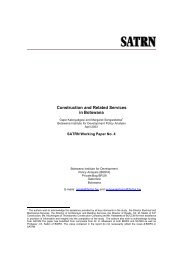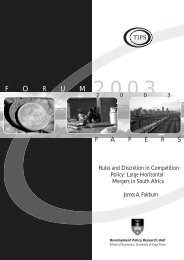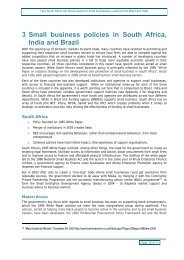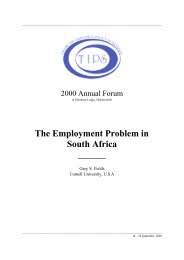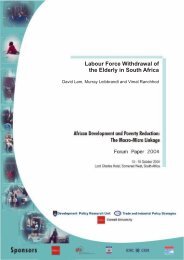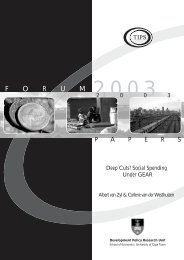You also want an ePaper? Increase the reach of your titles
YUMPU automatically turns print PDFs into web optimized ePapers that Google loves.
The draft document of the ICT charter covers various issues that will assist in<br />
implementation. These include key indicators/targets of the BEE in ICT, scope of the<br />
sector, linkage to legislative process, inclusivity, etc.<br />
It is difficult to discuss success of the BEE strategy in ICT. From the beginning of<br />
phase two BEE indicators will start flashing. This will be the good measurement level<br />
of the strategy. If South Africa wins in implementing this, how will this benefit the<br />
economy of the country?<br />
Some of the challenging issues raised in the BEE conference on 13 August 2003,<br />
Gallagher Estate Midrand<br />
- No BEE happening , no commitment from industry, 10 years now<br />
- Seta’s are working, sector is not commitment<br />
- Is the industry implementing SDA and EEA?<br />
- Are these companies submitting EE report to DOL?<br />
- This a delay, now what?<br />
- Process is too slow and frustrating to BEE companies<br />
- Does the industry need stick from the government?<br />
- Are local and multinational companies acting on BEE, i.e. ownerships and<br />
other related aspects<br />
- Nothing happening only roadshows<br />
Women in ICT<br />
ICT sector has been seen as a male-dominated sector. South African understood this<br />
in such a way that female felt embarrassed by working for this sector. Today South<br />
African women are starting to understand working in this sector.<br />
Even though women are challenging this sector, there are still a number of concerns<br />
that are barriers to working women including women in ICT. Some of these concerns<br />
include :<br />
- Management style in the sector. Research by van der Merwe and Stander<br />
(2002) revealed that about 60% of the women in ICT are concerned about<br />
the management style in this sector. Can this be an excuse for woman not<br />
applying positions in this sector? Which style of management most<br />
concerns women in the workplace? Is this an overall management style<br />
applied to women across all economic sector?<br />
- Training and re-skilling opportunities. Women are claiming that they are<br />
not given training and re-skilling opportunities in this sector. Is this true?<br />
Do they really have required educational background? What should be<br />
done to address this?<br />
- The dual roles of women. Women have family responsibility as well as<br />
work responsibility. Women see this as stumbling block to their career<br />
development. In their study, van der Merwe and Stander found that 52% of<br />
the women in ICT blame family commitments as challenge in their career<br />
development. There has been a debate among South Africans on 50/50<br />
5





